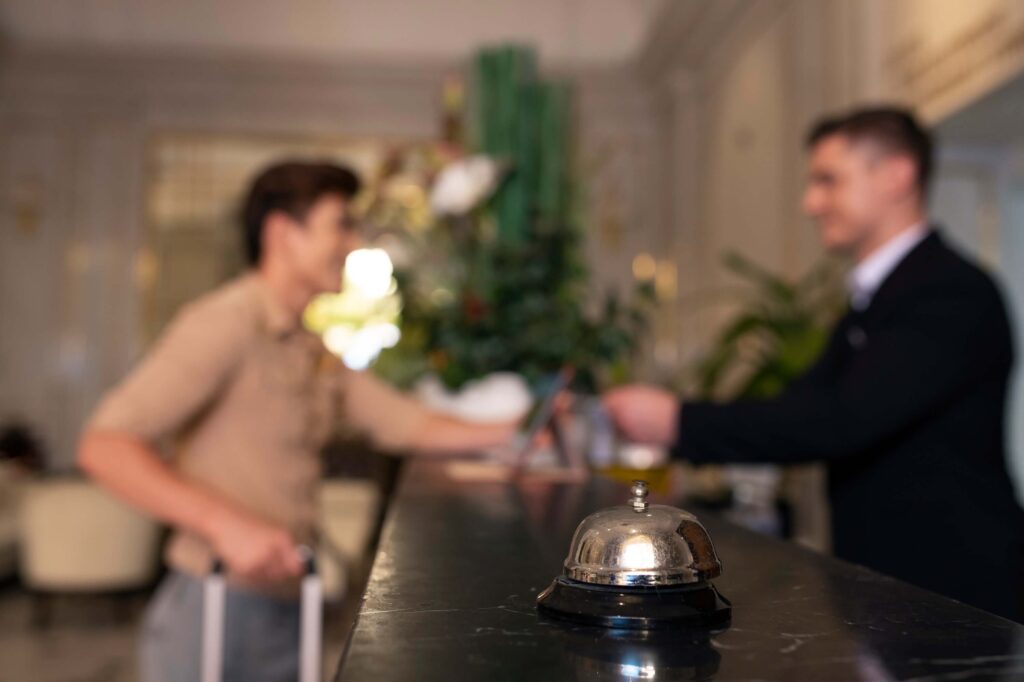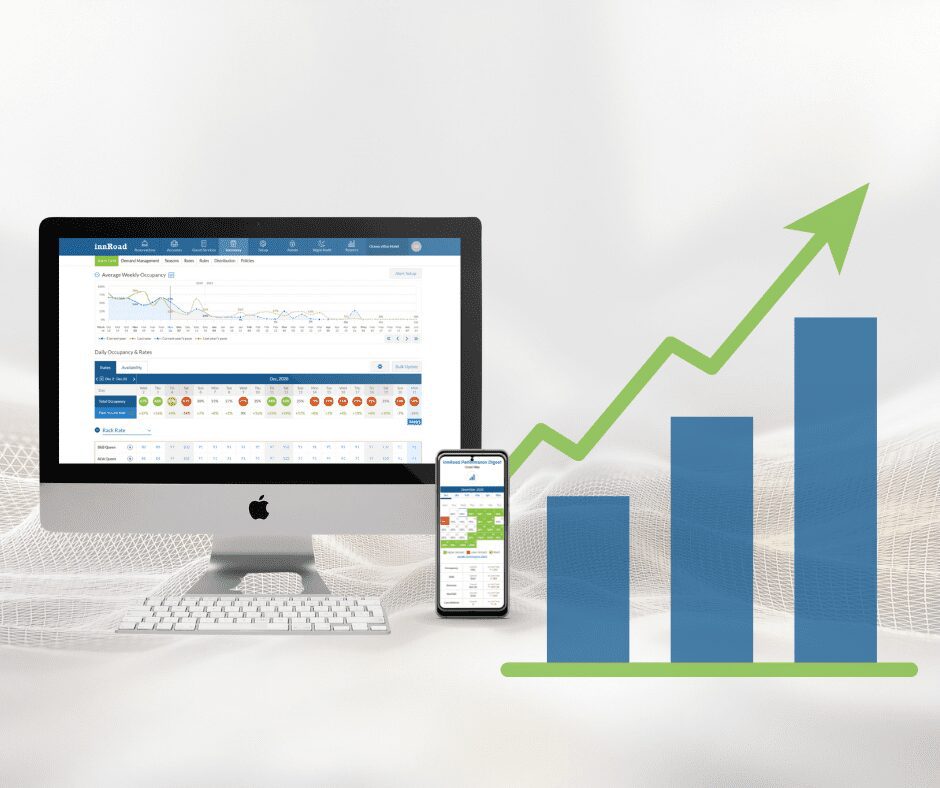It’s easy to set aside small repairs and preventive maintenance when guests are checking in and out every day and your staff is focused on managing all the demands of your busy season. But when your peak season has come and gone, you may not be able to ignore all that wear and tear.
With fewer guests to work around and (generally) cooperative weather, the end of your busy season is the perfect time to tackle maintenance tasks you’ve been putting off all summer. It’s also a great time to get started on your hotel preventive maintenance routine before your seasonal staff finish for the year, winter weariness sets in, or the weather gets so bad you can’t bring yourself to venture outside to make updates and repairs.
Hotel preventive maintenance is key to maintaining your small hotel’s cash flow and budget. Spending money on repairs before something breaks may seem unnecessary, but reactive maintenance (as in waiting for something to break before fixing it) is often costlier, and typically requires more downtime than planned preventive maintenance. Reactive maintenance can also negatively impact your guest experience if a key system breaks down when guest occupancy is high—if your pool filter or AC breaks down on a hot day, or your oven fails in the middle of a wedding you’re catering, for example.
Developing a maintenance schedule is key to managing preventable repairs and reducing unplanned downtime. In this post, we’ll start by taking a quick look at developing a hotel preventive maintenance schedule, then share our end-of-season hotel maintenance checklist.
Let’s get started.
Creating a Hotel Preventive Maintenance Schedule
If you don’t already have a hotel preventive maintenance schedule, start by assessing your equipment and systems to determine which may need your attention first, then build your schedule from there. Break up your preventive maintenance tasks into daily, bi-weekly, quarterly, seasonal, and bi-annual or annual tasks.
- Guest room inspections, including lighting, plumbing, climate control, appliances, furniture, and fixtures
- Common area inspections, including pools, lawns and landscaping, gym and spa equipment, laundry facilities, and windows and doors
- Building system inspections, such as meter readings for HVAC, boilers, and chillers, safety alarms, your industrial kitchen, plumbing, roof, and more
Seasonal hotel preventive maintenance tasks can include things like:
- Garden and outdoor space maintenance
- Door and window seals
- HVAC and refrigeration checks
- Parking lot maintenance
- Leak inspections
- Backup generator inspections and repairs
The exact nature of your seasonal maintenance will vary by season, so your springtime seasonal maintenance routine will be different from your end-of-season fall or winter maintenance. Let’s dig into our end-of-season hotel maintenance checklist.
End-of-Season Hotel Maintenance Checklist
Here are 11 key seasonal tasks that are perfect to tackle during the fall shoulder season:
1. Review your property improvement plan
Are you hoping to make large-scale changes or renovate your property? The end of your high season is a great opportunity to review your plans and get started on the updates, including:
- Starting to build a budget
- Applying for permits
- Reaching out to vendors—some vendors have long lead times and may not be able to start work till the spring.
2. Repairs you’ve been putting off
With busy season in your rear-vew mirror, it’s time to tackle all your minor repairs:
- Squeaky hinges, uneven tables, loose floorboards, dings in the drywall—whatever small repairs you’ve been saving for a rainy day.
3. Freshen up around your property
Take advantage of the still-favorable fall weather to:
- Add a fresh coat of paint while you can still keep the windows open
- Shampoo your carpets
- Deep clean guest rooms—pull out furniture and vacuum underneath, clean behind frames and mirrors, and dust tall spaces
- Check shower curtains for mold and replace them as needed
- Clean ventilation fans
- Lubricate door locks
4. Take an inventory of your supplies
With your busy season behind you, now is the time to:
- Take stock of all your key cleaning and maintenance supplies and equipment
- Re-order supplies or repair items as needed to make sure you’re set for the rest of your year.
- Pay special attention to winter-specific supplies, such as sand, kitty litter for iced-in cars, ice melter, and shovels or snow blowers, especially if you haven’t re-ordered supplies or inspected your equipment since the previous winter.
5. Start planning your garden
Growing season is sadly reaching an end, but that doesn’t mean the gardening work is over.
- Consider what grew well this past year and what didn’t, as well as what you did or didn’t use much, and use these insights to plan your garden for the coming year.
- Plant perennials and bulbs
- Check your irrigation system to make sure it’s working properly
- Inspect any outdoor seating and furniture to make sure everything is solid and secure before its winter hiatus
6. Inspect any recreational equipment
Clean, oil, and store any outdoor recreational equipment you may offer, such as:
- Bike rentals
- Boat rentals
- Life jackets
- Any other outdoor sports equipment
7. Winterize your property
Prepare your property for the coming winter by:
- Cleaning, draining, and sealing up spas, pools, and jacuzzis, as well as any outdoor cooking appliances or fire pits
- Check window and door seals for leaks, and seal up cracks as necessary to keep your wintertime energy bills as low as possible
- Inspect your floorboards and foundations for any possible pest intrusions, then seal them up and set traps as needed
- Cover shrubs and plants to protect them from snow
- Make sure your winter supplies are accessible. You never know when the first snow will fly!
8. First aid and safety supplies
- Examine and replenish your on-site first aid supplies, especially if they were used over the summer
- Check your fire extinguisher expiry dates and recharge or replace as needed
9. Lighting
- Check interior, exterior, exit, and peripheral area lighting and replace bulbs that have burnt out
- Adjust any automatic light timers for daylight savings or changing daylight hours
10. Equipment
- Clean and store outdoor cooking equipment like barbecues and smokers
- Clean and oil your snow clearing machinery so it’s ready at first snowfall
If you have a generator:
- Clean and inspect it
- Check the oil level and alarms
- Check fuel
- Make sure lines are clear, supports are tightened, and everything is properly lubricated
- Replace filters according to manufacturer’s recommendations
- Test it to confirm it’s working before a winter storm causes a power outage
11. Call in the pros
Some systems and equipment are not well-suited to DIY repairs (at least, not beyond simple things like changing air filters, testing your fire alarm, and replacing batteries). While it’s okay to give these things a look over on your own, most small hotel owners aren’t trained professionals, and it’s easy to miss things or overlook looming problems.
If you don’t have an expert on staff, now is a great time to bring in the pros to inspect your:
- HVAC
- Electrical
- Plumbing
- Pool care
- Fire safety
Checking Out
Preventive maintenance is an important part of running a small hotel. But managing these tasks can be challenging, and it’s easy for key actions to slip through the cracks.
In addition to helping you get more bookings and increase your revenue, a hotel property management system (PMS) can also help you schedule key maintenance tasks in advance so you don’t miss them when the time comes. You can even assign tasks to the right team member and they can easily mark tasks as complete so you’ll have complete visibility into when repairs and hotel preventive maintenance have been handled.
Learn more about task management with innRoad.
Discover innRoad's Small Hotel PMS
Keep Reading

What Is A Small Hotel Property Management System?

Types of Hotel PMS for Small Hotels

How Does Property Management System Software for Small Hotels Work?
